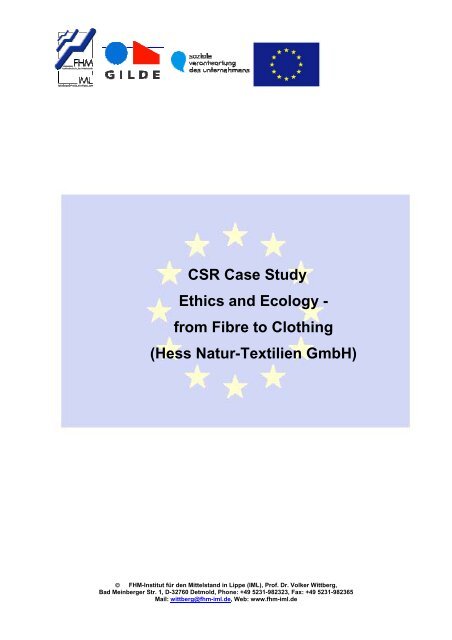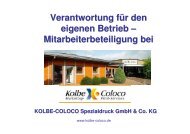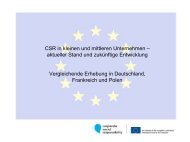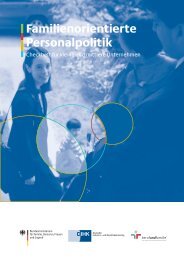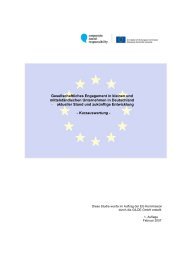CSR Case Study Ethics and Ecology - from Fibre ... - CSR Mittelstand
CSR Case Study Ethics and Ecology - from Fibre ... - CSR Mittelstand
CSR Case Study Ethics and Ecology - from Fibre ... - CSR Mittelstand
You also want an ePaper? Increase the reach of your titles
YUMPU automatically turns print PDFs into web optimized ePapers that Google loves.
Mainstreaming<strong>CSR</strong> amongSMEs<strong>CSR</strong> <strong>Case</strong> <strong>Study</strong><strong>Ethics</strong> <strong>and</strong> <strong>Ecology</strong> -<strong>from</strong> <strong>Fibre</strong> to Clothing(Hess Natur-Textilien GmbH)© FHM-Institut für den Mittelst<strong>and</strong> in Lippe (IML), Prof. Dr. Volker Wittberg,Bad Meinberger Str. 1, D-32760 Detmold, Phone: +49 5231-982323, Fax: +49 5231-982365Mail: wittberg@fhm-iml.de, Web: www.fhm-iml.de
Mainstreaming<strong>CSR</strong> amongSMEs<strong>CSR</strong> awards <strong>and</strong> certificates (a selection)• Organic Textile Award <strong>from</strong> the International Federation of Organic AgriculturalMovements (IFOAM) (1996)• “Pioneer of Ethical Trading” quality seal <strong>from</strong> Initiative <strong>Ethics</strong> in Business(2005)• Basic Certificate of the “Audit Beruf und Familie” (Career <strong>and</strong> Family Audit)(2006)© FHM-Institut für den Mittelst<strong>and</strong> in Lippe (IML), Prof. Dr. Volker Wittberg,Bad Meinberger Str. 1, D-32760 Detmold, Phone: +49 5231-982323, Fax: +49 5231-982365Mail: wittberg@fhm-iml.de, Web: www.fhm-iml.de
Mainstreaming<strong>CSR</strong> amongSMEs<strong>CSR</strong> in practice• <strong>CSR</strong> philosophy <strong>and</strong> strategyHess Natur finds the core of its identity in its ecological products manufactured in decentworking conditions that are sold under the br<strong>and</strong> of Hess Natur. Hess Natur’sfounding idea consists of a way of life in tune with nature; sustainable interaction withman <strong>and</strong> nature still today form the core of the company’s leitmotif. Thanks to thiscompany culture <strong>and</strong> to its products in line with this philosophy, Hess Natur has beenable to differentiate itself <strong>from</strong> traditional textile manufacturers <strong>and</strong> today it is the biggestcatalogue mail order company for thoroughly natural clothing <strong>and</strong> textiles inGermany.This social <strong>and</strong> ecological added value is acknowledged by sophisticated consumersby their purchasing decisions in which this represents a decision criterion. HessNatur satisfies these high customer dem<strong>and</strong>s as the first textile company that consistentlyfocuses on ecologically <strong>and</strong> socially responsible manufacture <strong>and</strong> it has thereforecreated its own unique identity. Independent organisations always guaranteecredibility <strong>and</strong> transparency, which is a precondition for the trust of these sophisticatedcustomers.Hess Natur’s ecological principles include:Exclusive use of natural fibres (e.g. cotton, wool, linen, silk).The cotton comes <strong>from</strong> controlled organic cultivation in which synthetic fertilisers<strong>and</strong> pesticides are never used. The fertility <strong>and</strong> health of the soil is© FHM-Institut für den Mittelst<strong>and</strong> in Lippe (IML), Prof. Dr. Volker Wittberg,Bad Meinberger Str. 1, D-32760 Detmold, Phone: +49 5231-982323, Fax: +49 5231-982365Mail: wittberg@fhm-iml.de, Web: www.fhm-iml.de
Mainstreaming<strong>CSR</strong> amongSMEsmaintained by rotation of crops in the fields <strong>and</strong> the use of organic fertilisers.The fight against insect pests <strong>and</strong> weeds is with mechanical or natural meanse.g. based on plants. Harvesting is by h<strong>and</strong>. Critical substances such as defoliationmedia are never used.Hess Natur’s virgin wool comes increasingly <strong>from</strong> controlled organic animalhusb<strong>and</strong>ry. With these animals the use of pesticides as protection against insectattacks is forbidden. Strict rules apply to the husb<strong>and</strong>ry, feeding <strong>and</strong>treatment of sickness of these animals (prohibition of the mulesing procedure,no creep feeding, no hormones, no antibiotics if possible etc.).Linen <strong>and</strong> silk, like wool, is to date only rarely <strong>from</strong> controlled organic productionso Hess Natur has for one thing set up its own organic agricultural projects(organic linen in Hessen, organic silk in China) <strong>and</strong> for another it stilluses natural materials <strong>from</strong> conventional production, which are also subject tostrict controls for harmful substances. Natur Hess would like to continue to increasethe proportion of fibres <strong>from</strong> controlled organic animal husb<strong>and</strong>ry <strong>and</strong>cultivation.What has been achieved:• 100% of all pure cotton articles come <strong>from</strong> controlled organic cultivation.• Proportion of wool <strong>from</strong> controlled organic animal husb<strong>and</strong>ry about 20%• Proportion of linen <strong>from</strong> controlled organic cultivation about 20%• Proportion of organic silk about 54%The basic underwear <strong>and</strong> baby wear made of virgin wool <strong>and</strong> silk come entirely© FHM-Institut für den Mittelst<strong>and</strong> in Lippe (IML), Prof. Dr. Volker Wittberg,Bad Meinberger Str. 1, D-32760 Detmold, Phone: +49 5231-982323, Fax: +49 5231-982365Mail: wittberg@fhm-iml.de, Web: www.fhm-iml.de
Mainstreaming<strong>CSR</strong> amongSMEs<strong>from</strong> controlled organic production.- Avoidance of questionable indirect materials throughout the textilechainIn order to make an article of clothing out of a raw material, it is necessaryto go through numerous production stages, starting with spinning, stitching<strong>and</strong> weaving, via bleaching <strong>and</strong> subsequent treatment of the fabric<strong>and</strong> on to dyeing <strong>and</strong> sewing together the individual pieces. In the courseof this process numerous chemicals might be used e.g. for dyeing <strong>and</strong>dyeing pre-treatment of fabrics or finishes that are intended to improve thecharacteristics of the article of clothing in wear <strong>and</strong> care.In the manufacture of its textiles Hess Natur always excludes indirect materialsthat are harmful to the environment or to health. In dyeing onlysafe dyes are used. So the st<strong>and</strong>ards prohibit the use of carcinogenic,mutagenic <strong>and</strong> allergenic dyes. These include for example azo dyes thatcan give off dangerous aromatic amines. The limits required for heavymetals are below the legal limits for drinking water – as they are everywhereelse at Hess Natur. The waste water flows into a waste watertreatment unit with at least 2 stages (e.g. mechanical <strong>and</strong> organic).Hess dispenses entirely with finishing in which the characteristic, beneficialproperties of natural fibres (e.g. active breathing) could be limited orlost. Instead Hess Natur manages to ensure that the textiles are durable,do not become matted, do not shrink <strong>and</strong> at the same time that© FHM-Institut für den Mittelst<strong>and</strong> in Lippe (IML), Prof. Dr. Volker Wittberg,Bad Meinberger Str. 1, D-32760 Detmold, Phone: +49 5231-982323, Fax: +49 5231-982365Mail: wittberg@fhm-iml.de, Web: www.fhm-iml.de
Mainstreaming<strong>CSR</strong> amongSMEs- they retain their active breathing characteristics <strong>and</strong> remain warm <strong>and</strong>skin-friendly by means of ecologically optimised mechanical finishingprocesses with for example the use of steam, heat <strong>and</strong> pressure.What Hess Natur does without:• Chlorine bleaches <strong>and</strong> optical brighteners• Moth <strong>and</strong> beetle protection finishes• Antimicrobial (biocide) <strong>and</strong> flame-resistant finishes• Allergenic <strong>and</strong> carcinogenic dyes• Felt-free, non-iron <strong>and</strong> easy-care finishes e.g. with the use of artificialresins.© FHM-Institut für den Mittelst<strong>and</strong> in Lippe (IML), Prof. Dr. Volker Wittberg,Bad Meinberger Str. 1, D-32760 Detmold, Phone: +49 5231-982323, Fax: +49 5231-982365Mail: wittberg@fhm-iml.de, Web: www.fhm-iml.de
Mainstreaming<strong>CSR</strong> amongSMEs- The st<strong>and</strong>ards of socially acceptable production lead, among otherthings, to the following principles:The observance of social st<strong>and</strong>ards i.e. ensuring decent working conditions<strong>and</strong> above all the protection of children, are a fundamental component of HessNatur’s company philosophy. In addition, the sustainable raw material sourcing<strong>and</strong> environmentally-friendly production contribute to the protection of thehealth of all those involved in the production process. In the context of its ownagricultural projects Hess Natur gives purchase guarantees at fair prices includingan organic <strong>and</strong> fair trade premium of up to 40%.The socially acceptable manufacture of textiles has been controlled by theDutch Fair Wear Foundation (FWF) since 2005. Hess Natur is thus to date theonly company in Germany that has its observance of decent working conditionsinspected by a “multi-stakeholder organisation.” FWF is supported byrepresentatives of various interest groups such as unions, non-governmentalorganisations <strong>and</strong> industrial associations <strong>and</strong> it thereby ensures a high level ofindependence <strong>and</strong> objectivity. The controls performed are based both on HessNatur’s internal inspections <strong>and</strong> on external verification by FWF <strong>and</strong> the FWFcomplaint system for suppliers’ employees. By these measures Hess Naturensures the observance of working conditions that are in line with the conventionsof the International Labour Organisation (ILO).The work of FWF <strong>and</strong> Hess Natur in Germany is assisted by a national multistakeholdercommittee that, besides Hess Natur <strong>and</strong> FWF, also includes IGMetall <strong>and</strong> the Clean Clothes Campaign (CCC).© FHM-Institut für den Mittelst<strong>and</strong> in Lippe (IML), Prof. Dr. Volker Wittberg,Bad Meinberger Str. 1, D-32760 Detmold, Phone: +49 5231-982323, Fax: +49 5231-982365Mail: wittberg@fhm-iml.de, Web: www.fhm-iml.de
Mainstreaming<strong>CSR</strong> amongSMEsCare is taken to ensure:• Fair wages• Decent working conditions• Controlled working hours• No child labour• No forced labour• No discrimination• Observance of freedom of association• Controlled employment relationship.© FHM-Institut für den Mittelst<strong>and</strong> in Lippe (IML), Prof. Dr. Volker Wittberg,Bad Meinberger Str. 1, D-32760 Detmold, Phone: +49 5231-982323, Fax: +49 5231-982365Mail: wittberg@fhm-iml.de, Web: www.fhm-iml.de
Mainstreaming<strong>CSR</strong> amongSMEs• <strong>CSR</strong> developmentThe milestones <strong>from</strong> the 30 years of Hess Natur’s history may be summarisedas follows:• 1976-1985 Focus on fabricThe birth of his first son is the impetus for the firm’s foundation: Heinz Hessbrings natural clothing into the world in order to protect the newborn <strong>from</strong> toxins<strong>and</strong> stress factors. His vision: Thoroughly natural clothing for a natural <strong>and</strong>healthy life.• 1985-1992 Focus on finishesThe limits of the ecologically possible are exp<strong>and</strong>ed <strong>and</strong> intensive chemicalfinishing is dispensed with. Hess Natur’s ecological quality guidelines lay thefoundation stone for a new clothing culture.• Since 1990 Focus on raw materialsThe first organic cotton project in the world is initiated – the take-off point formany other ecological, social <strong>and</strong> cultural Hess Natur projects throughout theworld.• Since 1995 Focus on designWith quality, design, durability <strong>and</strong> declaration of the textiles, Hess Naturmakes the change <strong>from</strong> its worn-out eco-image to colourful, stylish <strong>and</strong> highqualitynatural textile fashion.• Since 2002 Focus on social st<strong>and</strong>ardsWhat had been taken for granted since the start now becomes transparent<strong>and</strong> tangible: the socially acceptable manufacture of Hess Natur textiles. With© FHM-Institut für den Mittelst<strong>and</strong> in Lippe (IML), Prof. Dr. Volker Wittberg,Bad Meinberger Str. 1, D-32760 Detmold, Phone: +49 5231-982323, Fax: +49 5231-982365Mail: wittberg@fhm-iml.de, Web: www.fhm-iml.de
Mainstreaming<strong>CSR</strong> amongSMEsits campaign for “clean” clothing Hess Natur develops an innovative controlsystem <strong>and</strong> is the first German company to arrange for the manufacture of itsclothing under decent working conditions to be checked by an independentcontrol body (Fair Wear Foundation), a milestone for labour rights.Hess Natur’s aim in every development phase is to constantly position itself asa pioneer <strong>and</strong> thereby to satisfy its claim to be ahead of the field in ecological<strong>and</strong> socially acceptable fashion.© FHM-Institut für den Mittelst<strong>and</strong> in Lippe (IML), Prof. Dr. Volker Wittberg,Bad Meinberger Str. 1, D-32760 Detmold, Phone: +49 5231-982323, Fax: +49 5231-982365Mail: wittberg@fhm-iml.de, Web: www.fhm-iml.de
Mainstreaming<strong>CSR</strong> amongSMEs• <strong>CSR</strong> projectsHess Natur develops <strong>and</strong> supports innovative, socially committed <strong>and</strong> pioneering<strong>CSR</strong> projects e.g.• Burkina Faso agricultural projectControlled organic cotton cultivation• Hessen agricultural projectControlled organic linen cultivation• Social st<strong>and</strong>ards (pilot) projectIntroduction of a new kind of control mechanism (developed in-housewith the campaign for “clean” clothing (CCC)) for ensuring decent workingconditions. Hess Natur is therefore the first company in Germanythat satisfies the requirements of CCC with regard to the social st<strong>and</strong>ards<strong>and</strong> arranges for the checking of “clean” manufacture of its textilesby an independent control body (the Dutch Fair Wear Foundation).• Rhön sheep projectSupport for products made of German wool, especially Rhön wool.Sheep husb<strong>and</strong>ry in the region. Textile <strong>and</strong> garment manufacture isthen carried out as far as possible in German small <strong>and</strong> medium-sizedbusinesses. For example:Cooperation with Sassen/Richthof community. Purchase of h<strong>and</strong>manufacturedwoollen textiles <strong>from</strong> two villages in Schlitz in which about240 mentally h<strong>and</strong>icapped people work <strong>and</strong> live with non-h<strong>and</strong>icapped© FHM-Institut für den Mittelst<strong>and</strong> in Lippe (IML), Prof. Dr. Volker Wittberg,Bad Meinberger Str. 1, D-32760 Detmold, Phone: +49 5231-982323, Fax: +49 5231-982365Mail: wittberg@fhm-iml.de, Web: www.fhm-iml.de
Mainstreaming<strong>CSR</strong> amongSMEspeople in family communities.• Nepal projectSupport for a project in Nepal in which former leprosy sufferers with residualphysical disabilities receive education, work <strong>and</strong> income in textilefactories.• Intercultural Waldorf School, Mannheim projectProvision of Hess Natur school clothing for the children of the schoolwho come <strong>from</strong> 12 nations. Not a uniform but clothing that unites themwith a unified style, which supports integration <strong>and</strong> makes a contributionin this way to steer a course towards a sustainable <strong>and</strong> tolerant coexistenceof cultures in Germany.© FHM-Institut für den Mittelst<strong>and</strong> in Lippe (IML), Prof. Dr. Volker Wittberg,Bad Meinberger Str. 1, D-32760 Detmold, Phone: +49 5231-982323, Fax: +49 5231-982365Mail: wittberg@fhm-iml.de, Web: www.fhm-iml.de


